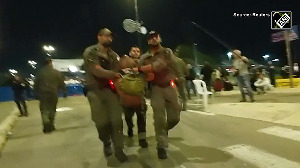
The small suburban house in the flight path of London's Heathrow airport gave no clue to neighbours that it was headquarters of a man accused of earning millions through fraud, and helping cause a trillion dollar "flash crash" on U.S. stock markets.
Navinder Singh Sarao is fighting extradition from Britain to face accusations he gamed the Chicago Mercantile Exchange, the largest U.S. futures market, using custom-made software that contributed to the brief May, 2010 crash.
His company is registered at his parents' home, a modest white pebble-dash semi-detached house in Hounslow, a working class neighbourhood on London's western outskirts, where neighbours said he never showed signs of wealth.
The May 6, 2010 "Flash Crash" saw the U.S. Dow Jones Industrial Average lose around 9 percent of its value within minutes before swiftly partially recovering.
The sudden lurch, accelerated by automatic computer trading, produced one of the biggest swings in U.S. stock market history, temporarily obliterating nearly $1 trillion in wealth.
U.S. authorities have charged Sarao, 36, with wire fraud, commodities fraud and manipulation.
Sarao told a London court he did not consent to extradition. His lawyer Joel Smith said: "This has come as a bolt from the blue for Mr Sarao".
The court set his bail on Wednesday at 5.05 million pounds, saying that was appropriate given the sums involved in the U.S. criminal complaint, and noting it was likely to dwarf the equity in the plain family home.
"Twenty-six million (pounds) has been mentioned," district judge Quentin Purdy said. "That could buy something even more lush than in Hounslow."
The unfolding drama has stunned Sarao's neighbours who said he never drove a car or wore fancy clothes. His parents and his brother's family, who live on the same street, are regular attendees at their local Sikh temple.
"I'm very shocked," said H.S. Johal, who lives next door to the Sarao family. "His parents are such nice people. What kids do these days, you just don't know."
"I've never seen any flash cars here. If they had money, they would have a BMW or Mercedes, not this," said Johal, gesturing towards a small green Vauxhall Corsa hatchback parked outside the Sarao house.
U.S. authorities say Sarao made $40 million between 2010 and 2014, and around the time of the Flash Crash in 2010 took steps to protect his wealth, opening a company called Nav Sarao Milking Markets in the Caribbean island of Nevis.
Another company, the International Guarantee Corporation, was opened in Anguilla in 2012 for "tax planning", the U.S authorities say, citing one of Sarao's "wealth management assistants."
For the year that ended in April 2011, the company at the centre of the allegations - Nav Sarao Futures Limited, founded in 2006 - had 21.5 million pounds held in a discretionary trust, established for the benefit of the families of company officers and employees, according to accounts filed in Britain.
Members of Sarao's family could not be reached for comment.
Sarao was the only director listed for Nav Sarao Futures according to the most recent company filing. Gurmatpal Dusanjh was listed as its company secretary.
A man living at a London address for Dusanjh told Reuters Dusanjh had moved to Dubai. It was not possible to contact him.
Another man, Miles Stewart MacKinnon, was listed as having served for four months as a director before resigning in October 2010. Mackinnon did not respond to an email and could not be reached by phone.
A simpler time
Sarao was described as a fun guy, outgoing and talkative by other members of the tight knit South Asian community with whom he joined in games like soccer, badminton and 40/40, a kind of tag, as a youth on Hounslow's streets.
"He was quite sweet - a chirpy chap. He was the youngest out of the lot, and he was the loudest of the lot. He was more engaged with people," said Anil Puri.
"It was great in them days, no computers, children's programmes 4:00 till 6:00, Dallas on Wednesday ... In them days you left the doors unlocked, and the streets were the life."
The U.S. Department of Justice says that from 2009 until March 2014 Sarao manipulated the market for E-Minis, a type of futures contract, by using a computer programme to generate large sell orders that pushed down their prices.
He would cancel his own sell orders in fractions of a second and then buy the contracts at the lower prices, to benefit when the market recovered, the U.S. criminal complaint says.
According to the complaint, Sarao described himself as, "an old school point and click prop trader" in May 2014 in response to a questionnaire sent by the British Financial Conduct Authority (FCA), which assisted the U.S. investigation.
Sarao also traded futures on Eurex, a German derivatives exchange. Eurex emailed Sarao's futures brokerage in July 2010 to ask Sarao about his entry and deletion of orders, including whether his orders were entered and deleted automatically or manually.
In response, according to the complaint, Sarao emailed, "I DO NOT use ANY computer program that minimises or reduces the chan[c]e of my trades being filled, unlike every other big trader on the exchange."
Eurex did not immediately respond to a request for comment.
The "flash crash" was triggered by a big move in the futures market for U.S. shares, which caused traders' automated software to sell.
The Department of Justice says Sarao contributed to that move by modifying 20 million lots on the E-Mini market, while the rest of the market combined modified fewer than 19 million. He made $879,018 from trading E-Minis that day, the complaint says.
(Additional reporting by Michael Holden, Lionel Laurent, Sudip Kar-Gupta, Francesco Canepa, Estelle Shirbon and Kirstin Ridley in London)








 © 2025
© 2025